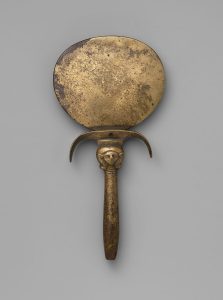Hebrew Word ‘Raqia’ Uncovered
Rethinking Earth’s Design in the Bible
We look into the etymology of the word Raqia in this post. When most people read Genesis 1, they picture a heliocentric model. They imagine a spinning globe orbiting the sun, all within a vast, expanding universe called space. Few consider a flat, motionless earth with a solid dome above it. Yet that’s the image Genesis presents.
Many skip past this first chapter, eager to reach the topic of sin—the real issue that plagues humanity. And rightly so. Sin is serious. It separates us from God. That’s why the Lord Jesus came—to rescue us from this deadly spiritual condition.
Is the Firmament a Stumbling Block or a Truth to Embrace?
However, let us return to the first chapter and look at the subtly obvious stumbling block scripture presents to us in Genesis 1:6.
Then God said, “Let there be a firmament (rāqîaʿ) in the midst of the waters (mayim), and let it divide the waters (mayim) from the waters (mayim).”
If you truly take God’s Word seriously—committed to trusting and obeying it—then you can’t ignore a single word. Every verse carries meaning, and each word holds value. God calls us to rightly divide the Word of truth and uncover the treasures hidden within this powerful book.
With that in mind, the word “firmament” demands our attention before we can move forward. God chose this specific term to describe what He used to divide the waters (mayim)—waters that, in the beginning, existed as a single, unified body. The Bible clearly states that God separated these waters by means of the firmament. Understanding what this means is essential, as it lays the foundation for the next phase of creation.
The word “firmament” originates from Middle English. It comes from Old French and traces back to the Latin word “firmamentum,” derived from “firmare,” which means “to fix” or “to settle.”
The understanding of Raqia
Studying word origins helps us understand what the ancient Hebrew text actually said. The word firmament appears 17 times in the Old Testament of the King James Bible. Each time, it translates the Hebrew word raqia.
What does a primitive root mean in Hebrew?
Every Hebrew word begins with two or three letters which we call an etymon (root word, primitive root). These etymons are an initial concept. We add letters to the beginning and end of the word to extend its meaning.
The word translated from Hebrew to our English word ‘firmament‘ is ‘raqia‘. Strongs concordance helps us understand how this word is to be used.
H7549 – rāqîaʿ
Pronunciation: raw-kee’-ah
Root Word (Etymology): From (H7554)
Outline of Biblical Usage:
- extended surface (solid), expanse, firmament
- expanse (flat as base, support)
- firmament (of vault of heaven supporting waters above)
- considered by Hebrews as solid and supporting ‘waters’ above
What Does the Bible Really Say?
In many modern Bible translations—such as the ESV, NIV, and others—the word “firmament” is translated as “expanse.” This common interpretation, however, often lacks a clear definition, allowing for various assumptions. Many readers equate this expanse with the Earth’s atmospheric layers or outer space.
But a closer look at the original Hebrew word raqia reveals something different. According to biblical lexicons, raqia refers to something solid—stretched out and firm. This creates a significant conflict for those who accept both the biblical account and the claims of modern science regarding space travel. If the firmament is solid, how can it be passed through?
For Christians who believe the Bible is the inspired, infallible, and authoritative Word of God, this raises important questions about the nature of the cosmos. I faced this tension myself. I learned that it’s far better to trust God’s Word than to impose my own theories or ideas upon it.
Etymology of Raqia
The word ‘raqia‘ is derived from another word, which we learn of in the ancient book of Job 37:18.
With Him, have you spread out (rāqaʿ) the skies,
Strong as a cast metal mirror?
The word rāqaʿ challenges those who suggest a gaseous atmosphere around a globe. This theory assumes the sky can be passed through.
H7554 – rāqaʿ
Pronunciation: raw-kah’
Root Word (Etymology): A primitive root
Outline of Biblical Usage:
- to beat, stamp, beat out, spread out, stretch
What the Hebrew Word Rāqaʿ Really Means
The word used for “firmament” in Genesis comes from the Hebrew rāqaʿ, which refers to the act of hammering or beating out a hard material—much like metal.
We see the same Hebrew word in Numbers 16. After Korah’s rebellion, the priests hammered bronze censers and applied them to the altar. You don’t hammer gas. Gas is too spread out. Hammering requires something dense—partially condensed and solid enough to shape with force.
Whether from conservative biblical scholars or secular linguists, there’s broad agreement: the original Hebrew rāqaʿ conveys the idea of something solid. The firmament, then, is not a vapor or atmospheric layer—it is a solid expanse positioned above the earth.
When we trace the meaning back through Scripture and language, the firmament resembles something like an ancient mirror, hammered and shaped into form. While some Bible versions describe it as “expanded,” that translation still aligns with the original concept of something stretched and formed—not vaporous or immaterial.
The firmament is solid, it cannot be passed through—except by divine intervention. The ascension of Jesus Christ (Luke 24:51) and the “windows of heaven” opened during the flood (Genesis 7:11) are rare, miraculous exceptions, not the norm.
Is the Firmament Solid or Gaseous?
Some may view the word firmament and assume it refers to a gaseous sky. This interpretation doesn’t align with Scripture. In Job 37:18, the firmament is described as “strong as a cast metal mirror.” This suggests something solid and firm.
The writer could have chosen a different comparison. Instead, he likened the firmament to a metallic substance—something shaped intentionally. In ancient times, craftsmen shaped brass by casting it in moulds or hammering it on anvils. A skilled artisan could transform a lump of metal into a thin, polished bowl with great precision.
This imagery connects directly with historical artefacts. Polished bronze mirrors were made by the Egyptians from 2900 BCE onwards. These Egyptian mirrors are spoken of in the biblical Book of Exodus (1500 BCE) —where the Israelite women donated their bronze mirrors for use in constructing the Tabernacle (Exodus 38:8). The association between the firmament and a mirror of hammered metal is not only symbolic but historically grounded.
Understanding the biblical firmament through the lens of its original language and ancient context reveals a vastly different picture than modern assumptions about Earth’s atmosphere. The word raqia points us to a solid, structured dome—intentionally crafted, like the work of a master metalworker.
The Concept of a Domed Earth
When God created the firmament, its strength and solidity required shaping. He moulded it into a great arched dome. This act reflects the very character of God—both powerful and purposeful. Just as He formed man from the dust of the earth Genesis 2:7, so too did His mighty hand shape the heavens.
With divine strength, God bent the firmament into place, stretching it over the earth to hold back the waters above. This imagery reveals not only His creative authority but also His intimate involvement in shaping both the world and humanity. The same hands that crafted the heavens also formed man—each moulded with intention, each brought into being by His power and will.
The Firmament: A Testament to the Glory of Jesus Christ
All things were made by Him and for Him Colossians 1:16, and the firmament is no exception. It stands as a visible display of God’s creative power and divine order. The very act of holding back the mighty waters above the firmament is not just a physical reality—it’s a reason to praise.
While there may be practical purposes for the firmament, such as the prevention of earth-wide flooding and the preservation of life on earth, its ultimate purpose is to glorify the Lord Jesus Christ. Just as a finely crafted vehicle reflects the skill of its maker, the firmament reveals the handiwork of God Psalm 19:1. It should stir awe and worship in the heart of every believer.
Exposing Secular Lies Through the Lens of Scripture
Much more exists to uncover on this topic. Many Scriptures await exploration. This post does not aim to be an exhaustive study. Instead, it encourages reflection and challenges the bold claims of secular belief systems.
People often present concepts like space travel, orbiting satellites, aliens, nebulas, black holes, and moon landings as undeniable truths. These ideas, however, come from a worldview that contradicts God’s Word. Scripture warns us in 1 Peter 5:8 that the Adversary is a deceiver. He uses powerful institutions to spread falsehood.
As believers, we are called to expose the unfruitful works of darkness Ephesians 5:11. We must bring the light of God’s truth into the hearts of parents and children.
The question is this: as a Spirit-filled follower of Christ, who fully trusts in God’s inspired Word—where will you stand? Will you align with the unshakable truth of Scripture? Or with the ever-changing ideas of the world?




This is a great explanation! I believe God’s Word and that we live on a flat, non-rotating earth covered by a solid dome firmament. God’s Word is true!